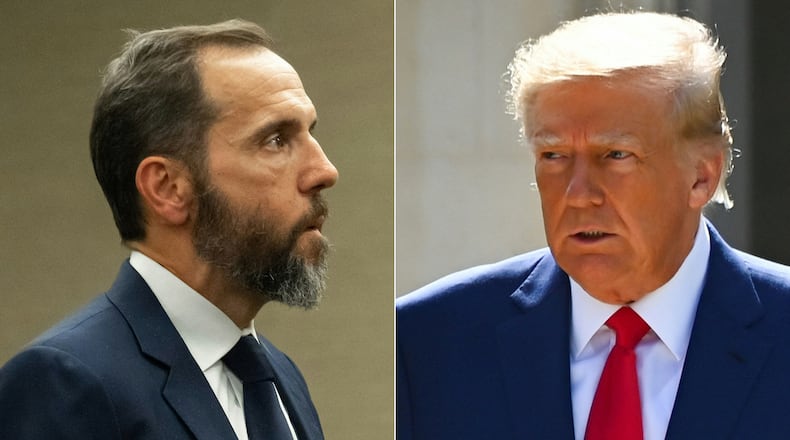Georgia played a prominent role in the federal election subversion case against former President Donald Trump that was handed down last summer. But several events related to the state’s 2020 vote count were removed in the superseding indictment brought by Justice Department special counsel Jack Smith on Tuesday.
The 36-page indictment came in response to the U.S. Supreme Court’s blockbuster decision last month that determined that presidents have “absolute immunity” for their official acts — but that they are not protected for their private, or unofficial, acts. By significantly slimming down the indictment from its original version, Smith is seeking to keep the case alive.
Gone now are references to Trump’s communications with the Justice Department, which a 6-3 majority on the high court ruled were broadly covered under presidential immunity. Removed are references to Co-Conspirator 4, who matched the description of Jeffrey Clark, a Trump loyalist at DOJ who drafted an unsent letter that falsely stated the department had found evidence of widespread election fraud in Georgia.
The new charging document also deleted a previous reference to a visit Mark Meadows, Trump’s final White House chief of staff, made to an absentee ballot audit in Cobb County in late 2020, as well as a conversation Trump had with attorney Sidney Powell about Dominion voting machines, which are used in Georgia and many other states.
The Supreme Court ruled last month that Trump couldn’t be “prosecuted for conduct within his exclusive constitutional authority,” including interacting with members of his executive branch, which presumably includes officials like Meadows and Clark.
Credit: TNS
Credit: TNS
Georgia still plays a major role in the superseding indictment, which charges Trump with four felonies, including conspiracy to defraud the United States and obstruct an official proceeding, as he sought to cling to power following his loss to Democrat Joe Biden.
Among the Georgia events that remain: the appointment of a slate of GOP electors, even though Biden had carried Georgia; and phone calls Trump placed to Secretary of State Brad Raffensperger and Attorney General Chris Carr, though the new charging document seeks to clarify that Trump was acting in his capacity as a candidate and not as president.
Smith also cites falsehood-filled testimony Trump’s personal attorney Rudy Giuliani delivered before a pair of statehouse committees about vote counting at Atlanta’s State Farm Arena. The special prosecutor once again includes bogus claims of election fraud that Trump cited about Georgia’s vote on social media and in lawsuits even though the Republican had been told by government officials and his own team that they were untrue.
“These claims were false, and the defendant knew that they were false. But the defendant used his campaign to repeat and widely disseminate them anyway — to make his knowingly false claims appear legitimate, create an intense national atmosphere of mistrust and anger, and erode public faith in the administration of the election,” the document states.
The fate of the federal case remains murky, especially given the short timeline before the November election. If Trump wins another term in the White House, he is expected to immediately direct his attorney general to kill the case and fire Smith.
Many of the same events cited in the federal indictment also play a part in the separate Fulton County case against Trump and 14 others. Meadows, Giuliani and Clark are among those who have been charged alongside their former boss. Powell had also been charged but struck a plea deal with prosecutors last fall.
The Supreme Court’s immunity decision is similarly expected to remake swathes of the Georgia case, which is currently in limbo as the state appeals court decides whether Fulton District Attorney Fani Willis should be removed from the case. Some legal experts previously told The Atlanta Journal-Constitution that counts related to Clark and potentially Meadows could be nixed, as well as certain evidence prosecutors used to buttress their racketeering charge.
Staff writer Bill Rankin contributed to this article.
About the Author
Keep Reading
The Latest
Featured






